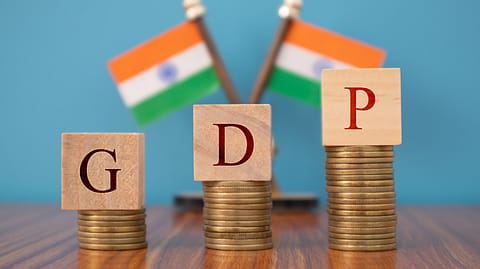ICRA upgrades FY26 GDP growth forecast to 6.5%, after Centre's GST rate rationalisation move
The agency notes that the GST rationalisation move is expected to give a boost to household consumption and to capital expenditure plans of domestic consumption-oriented private sector players.

As GST rate cuts, announced on Wednesday evening, are set to bring relief to consumers, credit rating agency ICRA has upgraded its GDP growth forecast to 6.5% from 6% for FY26.
In an August 26 note, ICRA had estimated the GDP growth for full fiscal year to be at 6.0%, ‘amid headwinds posed by uncertain trade policies and geopolitical scenario.’ The agency notes that this comes on the back of preponed revised GST rates implementation ahead of the festive season, and the better-than-expected Q1 GDP growth.
“Given the earlier-than-expected implementation of the GST rationalisation at the onset of the consumption-heavy festive period, and the sharper-than-expected Q1 GDP growth, we now assess FY2026 GDP growth at 6.5%, which remains dampened by the prevailing uncertainty related to US tariffs,” Nayar adds.
The agency notes that the GST rationalisation move is expected to give a boost to household consumption and to capital expenditure plans of domestic consumption-oriented private sector players.
Nayar, however, adds that there will be a need for the Centre to take ‘revenue mobilisation or expenditure-saving measures’ to make up for the moderate forgone revenue in the H2FY26.
“Any revenue foregone by the Centre and the states would effectively need to be compensated through other revenue streams or expenditure rationalisation,” Nayar says.
ICRA expects the Reserve Bank of India to continue to retain its growth forecast of 6.5% for the country’s full fiscal year GDP, as long as there is not any change in the U.S. tariff rates in upcoming months.
Recommended Stories
Across sectors, ICRA expects lower GST to benefit renewable, FMCG, healthcare, consumer electronics, and automobiles industry. Meanwhile, Prashant Vasisht, Senior Vice President and Co-Group Head, Corporate Ratings, ICRA Ltd. highlights that higher GST on oil and gas exploration is expected to raise production costs without offset, pressuring upstream companies already facing lower realisations.
“GST has been increased on exploration, development and production of oil and gas from 12% to 18% which would lead to increase in the cost of production of crude oil and natural gas. As crude oil and natural gas are outside the purview of GST, an increase in the cost of production without an offset available on sale of these products will lead to stranded taxes. Accordingly moderating realisations and increase in cost of production would be a double whammy for the upstream industry and could lead to some assets not being developed on account of poor returns,” he adds.